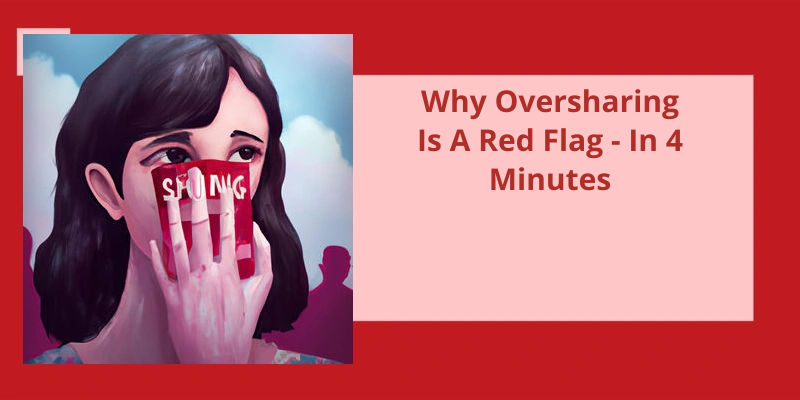In today's digital age, where information is readily shared and easily accessible, it’s become increasingly common for individuals to expose intimate details about their personal lives online. While social media platforms encourage users to share their thoughts, experiences, and emotions, there’s a fine line between sharing and oversharing. By examining real-life examples, exploring the psychology behind oversharing, and discussing the implications it holds for both individuals and society as a whole, you’ll gain invaluable insights into this pervasive modern phenomenon. So, join me as we unravel the truth about oversharing and learn to navigate the fine line between openness and oversharing in our increasingly connected world.
What Is Considered Oversharing in a Relationship?
Oversharing in a relationship can be subjective, as it depends on the level of comfort and trust between individuals. However, there are certain boundaries that most people consider when it comes to sharing personal information. For example, discussing intimate details of your past relationships, sexual experiences, or bodily functions may be considered oversharing, especially in the early stages of a relationship. It’s important to gauge the other persons comfort level and gradually disclose personal information as the relationship progresses.
Additionally, oversharing can occur when discussing financial matters. Sharing detailed information about your income, debt, or spending habits early on in a relationship can be overwhelming for the other person. Financial matters are often considered private, and discussing them too soon can put unnecessary pressure or discomfort on both parties.
Political or religious beliefs can also be areas where oversharing occurs. While it’s important to have open and honest discussions about these topics, going into extreme detail or passionately imposing your beliefs on others can be seen as oversharing. It’s crucial to respect and listen to the other persons perspectives, allowing for a healthy exchange of ideas without overwhelming or alienating each other.
While it’s essential to be vulnerable and open in a relationship, unloading all of your issues onto someone too soon can be emotionally overwhelming and even off-putting. Gradually revealing your vulnerabilities and allowing the relationship to develop organically can help build a stronger foundation for trust and emotional connection.
For some individuals, the act of oversharing can be a source of empowerment and liberation, enabling them to express themselves fully. However, for a considerable number of people, oversharing serves as a coping mechanism to deal with anxiety, stress, and unresolved trauma. In certain instances, excessive sharing may also signify a plea for assistance from those grappling with their mental well-being.
What Is Oversharing a Result Of?
Oversharing is often a result of underlying emotional struggles and insecurities that individuals may face. For many, sharing personal information and intimate details about their lives can serve as a way to gain validation and connection with others. It can be a means of seeking acceptance and understanding from peers or even strangers. By opening up and revealing the depths of their experiences, individuals may hope to find solace or empathy from those who can relate.
Furthermore, oversharing can be a coping mechanism for those burdened with anxiety, stress, and untreated trauma. Such individuals may find temporary relief in divulging their innermost thoughts and emotions, as it allows them to momentarily release the weight they carry. By sharing their pain or struggles, they may find comfort in knowing they aren’t alone in their experiences. However, it’s important to note that while oversharing may provide temporary relief, it isn’t a substitute for proper professional support or therapy.
It can serve as a coping mechanism for anxiety, stress, and untreated trauma, as well as a cry for help from those struggling with their mental health. Encouraging open communication is vital, but it’s equally important to prioritize the individuals well-being and guide them towards professional assistance if necessary.
Oversharing is a delicate balance that must be carefully managed. Not only can it make others feel uneasy, but it also has the potential to harm your personal and professional relationships. Once words have been spoken or posted, they can’t be taken back. It’s crucial to consider the potential consequences before sharing too much information, especially on social media platforms, where it can have a lasting impact on your reputation and future opportunities.
Why Is It Said to Be No to Oversharing?
Oversharing is often seen as a red flag because it can have negative consequences in various aspects of our lives. Firstly, when we overshare, we run the risk of making others feel uncomfortable. People have different boundaries and comfort levels when it comes to personal information, and overstepping those limits can create tension or unease in relationships. It can lead others to avoid being around us, as they may fear that we will continue to overshare or violate their privacy.
Moreover, once something is said, it can’t be taken back. This is especially true in the digital age, where oversharing through social media platforms can have long-lasting effects. What we share online can quickly spread and become difficult to control or erase. If we overshare personal details or share inappropriate content, it can damage our reputation and affect our personal and professional relationships. Potential employers and colleagues may come across the information, which could impact future job opportunities or promotions.
Furthermore, oversharing can also hinder our own personal growth. Constantly sharing our struggles or setbacks can create a mindset of victimhood or seeking validation. While it’s essential to seek support from loved ones, oversharing can turn us into perpetual complainers, preventing us from taking responsibility for our actions or finding solutions to our problems. It can create a cycle of negativity and dependency, ultimately limiting our personal development and emotional well-being.
It’s crucial to be mindful of what and how much we share with others. Learning to establish healthy boundaries and exercising discretion in what we disclose can help us form stronger connections, protect our privacy, and cultivate a positive and constructive image in both personal and professional spheres.
Source: Why is oversharing not a good thing?..
It’s essential to strike a balance when it comes to sharing personal information in a relationship. While openness is valued, oversharing can have negative consequences. It can cause discomfort, emotional exhaustion, and an uneven distribution of emotional labor in the partnership.
Why Oversharing Is Bad in a Relationship?
Oversharing in a relationship can be a red flag because it can create discomfort and emotional exhaustion for both partners involved. While it’s important to share personal information with your partner to build trust and intimacy, oversharing goes beyond that and can become overwhelming. When one partner continuously shares excessive personal information, it can leave the other partner feeling burdened and unable to escape from the constant emotional labor. This can lead to a significant imbalance within the relationship, where one partner feels emotionally drained while the other partner remains emotionally detached.
Effective communication involves a balance of sharing and listening, but oversharing can often dominate the conversation and hinder the ability to effectively communicate and understand each others needs. It’s important for both partners to have a space and opportunity to express themselves, rather than one partner dominating the conversation with an overflow of personal information.
It can cause discomfort, emotional exhaustion, and an unequal balance within the relationship. It’s crucial for partners to find a balance between sharing and maintaining boundaries in order to foster a strong and healthy relationship.
Conclusion
By analyzing the various reasons behind this behavior and understanding it’s potential implications, we gain valuable insights into the importance of maintaining boundaries and discretion. Oversharing can indicate insecurity, attention-seeking, or even a lack of emotional intelligence. It can lead to negative outcomes such as discomfort, a loss of trust, and a potential misjudgment of character. It’s crucial, therefore, to recognize the balance between openness and oversharing, allowing for genuine connections to flourish while valuing privacy and maintaining a sense of self-respect. Being mindful of what we share, when we share it, and with whom we share it, can ultimately lead to healthier relationships and a more fulfilling life experience.






